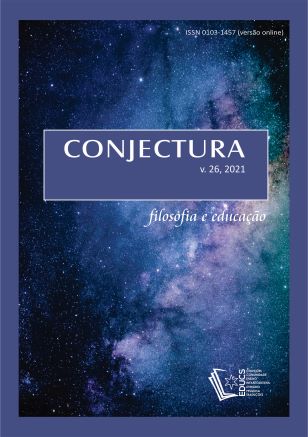Dos ideários neoliberais à constituição de políticas de formação docente brasileira: tempos de recessão ideológica ou alienação mercadológica?
DOI:
https://doi.org/10.18226/21784612.v26.e021010Resumen
A formação docente brasileira foi marcada por interlocuções epistêmicas, mudanças e transformações estruturais e conjunturais, atreladas aos âmbitos sociais, culturais, econômicos, jurídicos e políticos, influenciando e (re)configurando as dimensões do ser professor. Sua configuração, como um ser social, permite a transposição dicotômica entre conhecimentos científicos e senso comum, possibilitando reflexões a uma análise conjuntural acerca da realidade posta, efetivando a essencialidade do processo formativo elucidada a partir do rompimento alienado efetivado por meio dos princípios ideológicos que regem, fragilizam e fragmentam essa formação. Propomos analisar evidências delineadas na Resolução CNE n. 6/2018 (BRASIL, 2018), acerca da implementação nacional de políticas institucionalizadas neoliberais para formação docente em Educação Física. Para tal feito, nos ancoramos em características investigativo-descritivas com pressupostos de análise de conteúdo e documental (MINAYO, 2016), sustentados pelo subentendimento da teoria da alienação trazidas por Konder (2008, 2009). Diante das análises, destacam-se indicadores dos ideários neoliberais, transcritos por meio de orientações com vistas à formação docente para atuação no mundo do trabalho. A partir das orientações normatizadas em prol de um processo formativo com competências e habilidades, delineadas nos indicadores destinados à “área de estudo e pesquisa”; “área de conhecimento específico para educação”, “atividade acadêmica para prática pedagógica”; e “componente curricular”, evidenciando os pressupostos de uma formação sistêmica e linear, subscrevendo a formação humana do futuro professor a determinados interesses e com viés que diverge dos pressupostos educacionais, suscitando uma possibilidade de alienação, induzindo à formação docente por meio de uma ideologia prescrita subliminarmente, à qual o profissional em formação será submetido, dificultando, por vezes, a construção de um conhecimento que propicie sua emancipação de forma crítica e reflexiva acerca da realidade social.
Palavras-chave: Educação Física. Formação docente. Neoliberalismo. Alienação
Citas
ANVERSA, A. L. B.; SOUZA, V. F. M. Educação em Gramsci: aproximações com o campo da Educação Fsica. Práxis Educacional, Vitória da Conquista, v. 12, n. 23, p. 153-174, set./dez. 2016.
BARROS, J. D. O conceito de alienação no jovem Marx. Tempo Social –Rev. de Sociologia da USP, São Paulo, v. 23, n. 1, jun. 2011.
BASSO, D.; BEZERRA NETO, L. As influências do neoliberalismo na educação brasileira: algumas considerações. Itinerarius Reflectionis, Jataí, v. 1, n. 16, jan./jun. 2014.
BAUMAN, Z. Tempos líquidos. Tradução de Carlos Alberto Medeiros. Rio de Janeiro. Jorge Zahar, 2007.
BISCONSINI, C. S.; OLIVEIRA, A. A. B. Formação inicial em Educação Física e as aprendizagens com a escola: a possibilidade da prática como componente curricular. Motrivivência, Florianópolis, v. 31, n. 58, p. 1-20, abr./ jul. 2019.
BRASIL. Ministério da Educação. Conselho Nacional de Educação. Câmara de Educação Superior. Resolução n. 6, de 18 de dezembro de 2018.
CUNHA, L. A. Educação e desenvolvimento social no Brasil. 3. ed. Rio de Janeiro: Francisco Alves, 1978.
FLORES, Patric Paludett et al. Formação inicial de professores de Educação Física: um olhar para o estágio curricular supervisionado. Caderno de Educação Física e Esporte, Marechal Cândido Rondon, v. 17, n. 1, p. 1-8, jan./jun. 2019.
FREIRE, P. Educação e mudança. Tradução de Lilian Lopes Martin. 38. ed. rev. e atual. Rio de Janeiro: Paz e Terra; São Paulo: Paz e Terra, 2018.
GENTILI, P. Neoliberalismo e educação: manual do usuário. In: SILVA,
T. T. da; GENTILI, P. (org.). Escola S. A.: quem ganha e quem perde no mercado educacional do neoliberalismo. Brasília: CNTE, 1996.
KOGA, Y. M. N.; GUIDANI, E. R. Educação e neoliberalismo: interferências numa relação tirânica. Simbiótica, Vitoria. v. 4, n. 2, jul./dez. 2017.
KONDER, L. Marxismo e alienação: contribuição para um estudo do conceito marxista de alienação. 2. ed. São Paulo: Expressão Popular, 2009.
KONDER, L. O que é dialética? São Paulo: Brasiliense, 2008.
MAGALHÃES, F. 10 lições sobre Marx. 6. ed. Petrópolis: Vozes, 2015.
MARX, K. Contribuição à crítica da economia política. São Paulo: Martins Fontes, 1977.
MINAYO, M. C. S. O desafio da pesquisa social. In: MINAYO, M. C. S.; DESLANDES, S. F.; GOMES, R. (org.). Pesquisa social: teoria, método e criatividade. Petrópolis: Vozes, 2016.
MINAYO, M. C. S. Pesquisa Social: teoria, método e criatividade. Petrópolis: Vozes, 2009.
MOREIRA, E. S. G.; SOUZA, C. F. Políticas públicas: o neoliberalismo e a educação sob a ótica da racionalidade capitalista. In: SEMANA DE LICENCIATURA,13.; SEMINÁRIO DA PÓS-GRADUAÇÃO EM EDUCAÇÃO PARA CIÊNCIAS E MATEMÁTICA, 4.; ENCONTRO DE EGRESSOS DO MESTRADO, 2.; ENCONTRO DE EGRESSOS DA LICENCIATURA; PRÁTICAS PEDAGÓGICAS PARA INCLUSÃO E DIVERSIDADE, 2016, Jataí. Anais [...], Jataí, 2016.
NETTO, J. P. O que é marxismo? São Paulo: Brasiliense, 2006.
NETTO, Raul Sardinha; AZEVEDO, M. A. R. Concepções e modelos de formação de professores: reflexões e potencialidades. B. Téc. Senac, Rio de Janeiro, v. 44, n. 2, maio/ago. 2018.
SEVERINO, A. J. Metodologia do trabalho científico. 23. ed. rev. e amp. São Paulo: Cortez, 2007.
SILVA, J. C. Educação e alienação em Marx: contribuições teóricometodológicas para pensar a história da educação. Histedbr, Campinas, v. 19, set. 2005.
SILVA, P. C. Individualismo e alienação: condições e contradições do ser social em Karl Marx. Ideação, Feira de Santana, v. 3, n. 9, jan./jun., 2019.
SMITH, A. A riqueza das nações. São Paulo: Nova Cultural Ltda., 1996.
Descargas
Publicado
Cómo citar
Número
Sección
Licencia
1. A publicação dos originais implicará a cessão dos direitos autorais à revista Conjectura.
2. Os textos não poderão ser reproduzidos sem autorização da revista depois de aceitos.

Este trabalho está licenciado com uma Licença Creative Commons - Atribuição 4.0 Internacional.









